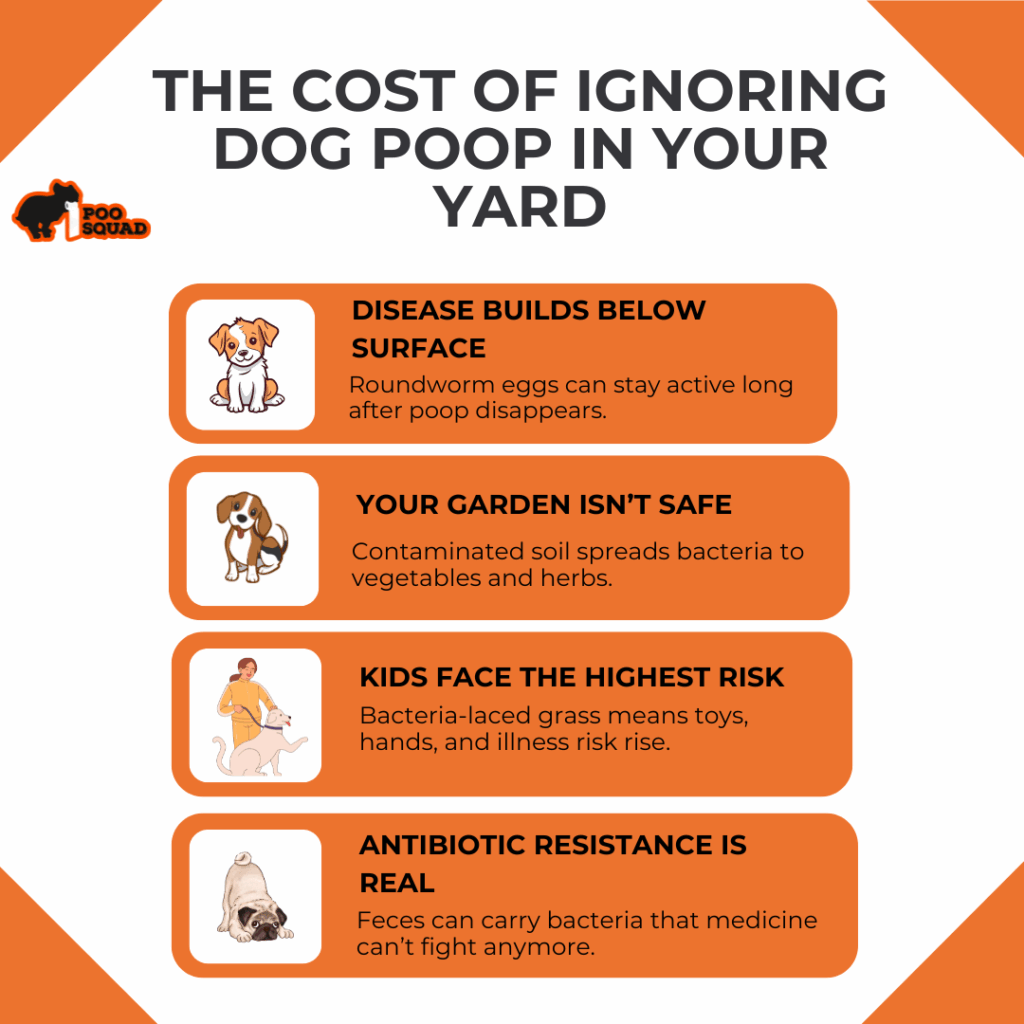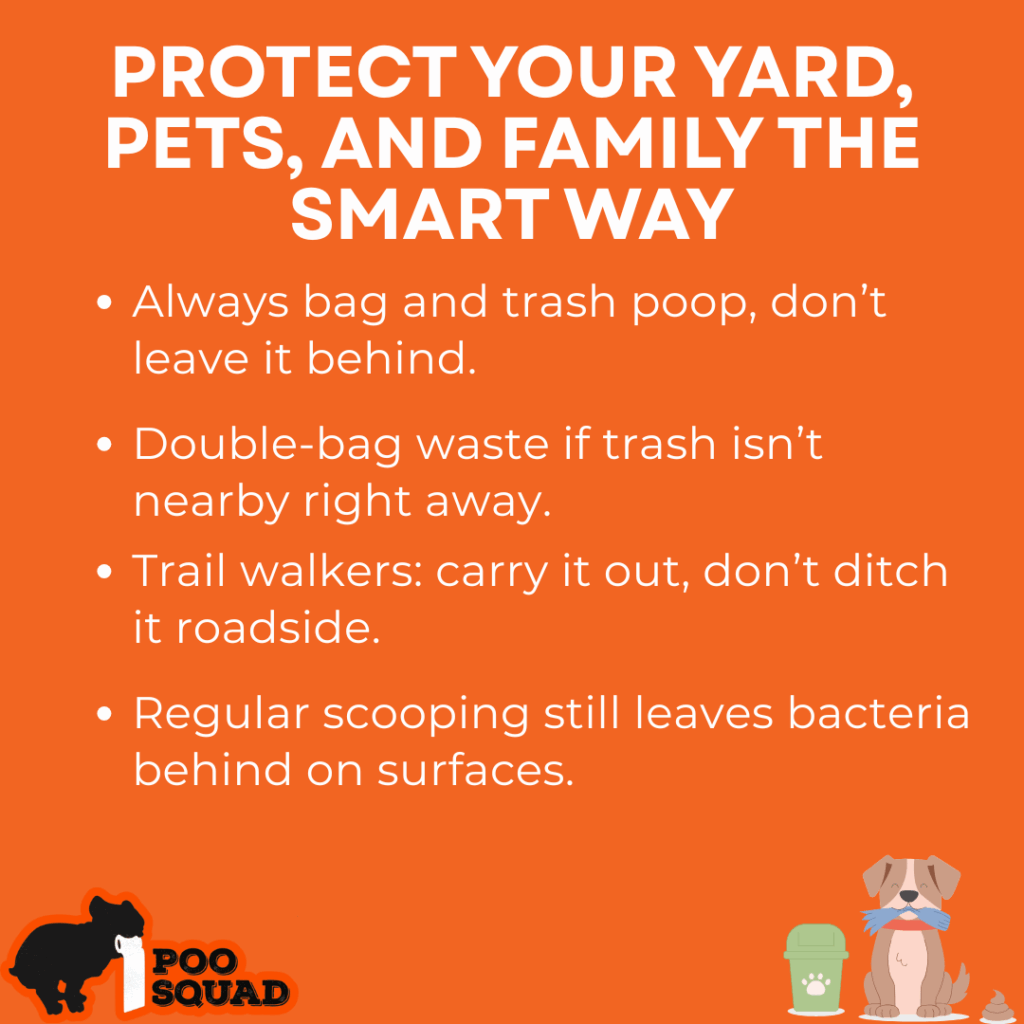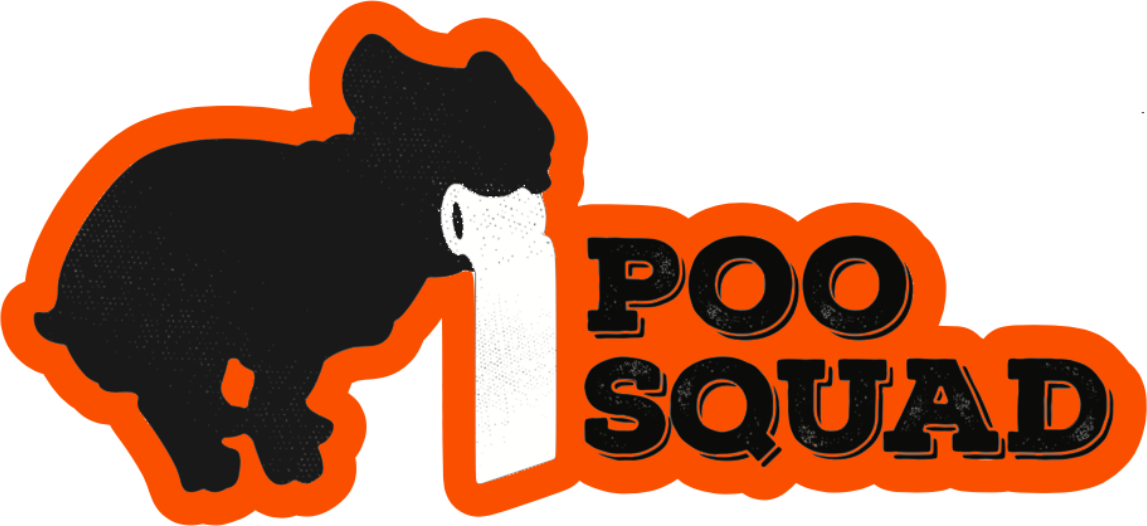Dog poop contains harmful bacteria like E. coli, Giardia, and Salmonella, which can infect humans, pets, and contaminate soil and water. Even dried or hidden waste can spread illness. Routine scooping and sanitation are critical to prevent long-term exposure and reinfection.
Dog poop is not only a cleanup issue; it’s a health hazard hiding in plain sight. What looks like a simple pile in the yard often contains dangerous bacteria like E. coli, Giardia, and Salmonella. These pathogens don’t only vanish after the mess dries or gets rained on; they survive in soil, spread through runoff, and infect both pets and people long after the pile is gone.
Many homeowners assume pet waste breaks down naturally over time. But in reality, even one gram can contain millions of bacteria that stick around for weeks, or even years, if not properly cleaned and sanitized. From kids playing in the grass to gardeners handling contaminated soil, the risks show up everywhere life happens outdoors.
Bacteria and parasites live in dog poop. How do they spread, and what steps prevent exposure before it becomes a serious health concern?
What’s Lurking in Dog Poop? A Look at Harmful Bacteria and Parasites
Dog poop might look harmless once it dries up, but what’s inside tells a much different story. Even small amounts of waste can carry millions of bacteria and parasites that linger in your yard long after the mess is gone. This is not about being dramatic, it’s about being informed.

E. coli and Salmonella – Hiding in Plain Sight
Both E. coli and Salmonella are regularly found in dog waste. These bacteria can survive for days in outdoor environments, especially when poop is left to sit. They don’t need direct contact either; shoes, paws, and lawn equipment can easily spread them inside your home.
What makes them even more alarming is that infections don’t always show up right away. Symptoms like stomach cramps, diarrhea, or fever might not immediately connect to your dog’s waste. And while healthy adults can usually fight them off, children, elderly family members, and immunocompromised individuals are far more vulnerable.
Giardia and Coccidia – Invisible but Aggressive
Giardia and Coccidia thrive in moist environments and can survive for weeks in contaminated soil. Dogs can get reinfected simply by walking through their poop, or worse, licking their paws afterward. We’ve seen this cycle time and again, especially when waste isn’t removed regularly.
These parasites don’t need a visible mess to spread either. A patch of damp grass can carry the same microscopic dangers as a fresh pile of poop.
That’s why our yard sanitation and deodorizer services are designed to go beyond the surface, killing what you can’t see before it spreads.
Roundworms, Hookworms, and Whipworms – A Soil-Based Nightmare
These parasites are shockingly resilient. Roundworm eggs can survive for years in the soil. Hookworms? They’re even sneakier; larvae can penetrate skin through bare feet. Yes, it happens more often than you’d think, especially with kids or gardeners working barefoot in previously contaminated areas.
Whipworms, on the other hand, spread through contaminated water or soil and can be ingested unknowingly during everyday activities in the yard. These parasites not only pose a risk to your dog, but they also threaten your entire family.
And no, bagging up the poop doesn’t solve the problem if you leave residue behind. Once the soil is compromised, bacteria and parasites will stick around until the area is fully sanitized.
Parvovirus – Devastating and Long-Lasting
Parvovirus is a highly contagious virus that can survive on the ground for months, especially in shaded or cool areas. It’s particularly lethal to puppies and unvaccinated dogs, and it spreads through fecal matter faster than most pet owners realize.
We’ve worked with several families who had no idea they were reintroducing Parvo risks into their home simply by walking across the yard. That’s why our protocols for tool and shoe sanitation between yards aren’t an extra; they’re essential.
How Dog Poop Spreads Bacteria to People, Pets, and the Planet
The mess left behind by one dog can ripple out far beyond your backyard. Bacteria and parasites don’t stay put; they travel on paws, boots, garden tools, and even rainwater. What starts as a single pile can turn into a widespread problem affecting people, pets, and ecosystems.

From Yard to Living Room: How Contamination Sneaks In
You may not realize it, but bacteria from dog poop don’t always need direct contact to enter your home. Foot traffic, both human and canine, is a major carrier. The bacteria latch onto shoes and paws, then end up on your floors, rugs, and even your kids’ hands.
This is particularly risky for households with young children who play outside or crawl indoors. We’ve helped dozens of families who were unknowingly tracking bacteria through their living spaces simply because their yard hadn’t been cleaned as frequently as it should’ve been.
Contaminated Soil Doesn’t “Get Better” on Its Own
We often hear from homeowners who assume rain or time will wash the danger away. The truth is, bacteria like roundworms and Giardia can remain viable in soil for months, even years. Poop may disappear, but the danger beneath the surface remains.
If your family enjoys gardening or growing food in the yard, the stakes are even higher. Contaminated soil poses a real risk to edible plants. That’s why regular scooping and targeted sanitation is far more than a convenience; it’s protection.
Waterways and Storm Drains: The Bigger Environmental Cost
Here’s where things go from personal to public. When it rains, dog waste left in yards and parks often ends up in storm drains. That runoff doesn’t get treated; it flows directly into lakes, rivers, and even the ocean. It’s one of the leading sources of bacterial pollution in local waterways.
This is not a theoretical concern. High levels of fecal bacteria have closed beaches, contaminated fishing zones, and triggered algae blooms that choke out aquatic life. If your dog’s waste is not cleaned up properly, it might not stay in your yard; it might end up in someone’s water supply.
If your property is near drainage areas or community parks, our commercial scooping services are structured to reduce these long-range bacterial threats while keeping shared spaces clean and compliant.
What Happens if You Ignore the Problem?
Leaving dog poop in your yard doesn’t make it go away; it makes things worse. The longer it sits, the deeper the damage. From long-term soil contamination to avoidable health scares, neglecting to scoop or sanitize creates an environment that’s both unhealthy and unsafe.

Your Yard Becomes a Breeding Ground for Disease
Over time, waste breaks down and seeps into the soil. But that doesn’t mean it disappears. Roundworm eggs and bacterial pathogens stay active beneath the surface, where they can reinfect pets or transfer to humans without a single visible pile left behind.
We’ve walked onto properties where a yard looked clean but was loaded with years of microbial buildup. It takes more than a rake and a sunny day to fix that; it takes sanitization.
The Garden Is Not Safe Either
If you’re growing vegetables or letting kids dig around in the yard, contaminated soil is more than a “gross” problem; it’s a health risk. Fecal bacteria can transfer from soil to produce, especially root vegetables or anything growing close to the ground.
We’ve heard plenty of questions like, “Can bacteria in dog poop affect my garden?” The answer: absolutely. And once the contamination is in the soil, there’s no safe harvest until the ground is properly treated.
Kids Are Most at Risk
Children are the most vulnerable when yards go unscooped. They play with toys on the ground, crawl through grass, and often put their hands in their mouths. One gram of dog poop can contain millions of bacteria, enough to cause serious illness from what might look like a normal afternoon outside.
It’s heartbreaking to hear stories from parents who “didn’t think it was that big of a deal” until someone got sick. That’s why we take this job seriously. What we’re removing is not only waste, it’s risk.
Antibiotic-Resistant Bacteria Are Now Part of the Equation
Here’s what’s newer and even more alarming: studies are finding strains of E. coli in dog feces that resist multiple antibiotics. These bacteria don’t stop spreading when they’re bagged up. If the soil is not sanitized or the tools used to clean are cross-contaminated between yards, the danger multiplies.
That’s one reason why our team sanitizes every tool and shoe between properties, no shortcuts, no exceptions.
How to Protect Your Home, Family, and Community
You can’t control where bacteria exist, but you can control how much of it make its way into your yard, your home, or your family’s daily life. By staying proactive with prevention, hygiene, and professional help, you protect everyone under your roof and beyond it.

Safe Dog Poop Disposal Tips That Work
The safest solution is the simplest: remove poop promptly and correctly. That means scooping every time your dog goes, using a sealed waste bag, and placing it in the trash. And yes, double-bagging is a smart move, especially if you’re not taking it to the bin right away.
For those who hike or use trails with pets, it’s critical not to leave bagged waste on the side. Even sealed bags break down and leak bacteria into the ground. Keep it with you until you can throw it away properly.
Sanitize the Yard, Not Just the Surface
Scoop all you want, but if your yard has been contaminated before, or hasn’t been treated in months, you’re still at risk. The bacteria stay in the grass, on the soil, and even on outdoor surfaces like decks or patios.
We offer sanitization and deodorizer services designed for yards, dog runs, patios, and more. It’s pet-safe, people-safe, and scientifically backed to break down the bacteria that scooping alone can’t touch.
Why Going Pro Is Worth It
We’ve met too many folks who thought hiring a neighbor kid or doing the job themselves was “good enough.” The problem is, if tools aren’t sanitized, gates aren’t latched, or reminders are missed, small mistakes turn into big problems.
Our teams are background-checked, wear high-visibility orange, and arrive in branded trucks so you always know who’s in your yard.
Our protocols go beyond clean; they go into safety. We don’t use your hose, your trash, or your tools. That’s how you avoid cross-contamination and accidents, while reclaiming your time and peace of mind.
Community-Wide Responsibility: Don’t Be the Source of the Problem
Dog poop is not only your problem; it becomes everyone’s problem when left unattended. Whether it’s your backyard, your local park, or a shared apartment lawn, one overlooked pile can lead to a chain reaction of contamination, discomfort, and community complaints.
What Happens When It Rains? It Doesn’t Wash Away the Risk
Rain doesn’t clean, it carries. That runoff takes bacteria and parasites from lawns and deposits them into nearby drains, which connect to natural water sources. This contributes to higher bacteria levels in rivers and lakes and can even result in beach closures or public health warnings.
We work with property managers, HOAs, and municipalities who’ve seen firsthand how overlooked pet waste turns into liability.
Our commercial dog waste removal services help prevent those issues before they ever hit your inbox or inspection report.
Shared Spaces, Shared Responsibility
Apartment communities, dog parks, and shared courtyards are especially vulnerable to repeated contamination. It’s often unclear who’s responsible for cleaning, and when no one steps up, everyone pays the price. Residents complain, guests notice, and the whole property takes a hit in cleanliness and curb appeal.
We step in with scheduled cleanups, consistent reporting, and trained professionals who keep the space safe and sanitary. Our service doesn’t rely on tenants or building staff, it’s handled start to finish.
Why This Matters More Than Ever
We talk a lot about community, but that’s because it’s personal. When we clean a yard, a park, or a sidewalk, we’re not only removing poop, we’re protecting dogs from reinfection, toddlers from illness, and neighborhoods from reputational harm. It matters. That’s why we show up.
The Health of Your Yard Reflects the Health of Your Pack
When it comes to dog poop, what’s out of sight shouldn’t be out of mind. Every unscooped pile carries more than a smell; it carries bacteria, parasites, and risk. Whether it’s lingering in your yard, washing into the community water supply, or infecting your pet through re-exposure, the consequences are real.
We’re built around the idea that no one should have to choose between their time and their family’s health. Our tools, our people, and our protocols are focused on doing this job the right way, every time.
From residential cleanups to sanitizing services, we’re not in this to “remove poop”; we’re here to remove problems before they grow.
Because when your yard is clean, your family is safer. And that’s what this job is really about.
Questions About Bacteria in Dog Poop
Dog poop is more than a pet owner’s nuisance; it’s a health and environmental issue that raises plenty of questions. Here are some of the most common concerns we hear from families, gardeners, and community leaders looking to stay informed and protected.
Can bacteria from dog poop survive once it dries?
Yes, many bacteria and parasite eggs stay active long after the poop has dried or been rained on. Dry or broken-down feces can be more dangerous because people assume the risk is gone when it’s not.
Is composting dog poop safe?
Not for most people. Composting dog poop requires high temperatures to kill pathogens, and most home compost piles don’t reach those levels. Unless you’re using a specialized system designed for pet waste, it’s better to dispose of it properly in the trash.
Can bacteria from dog poop affect my vegetable garden?
Absolutely. If your dog goes to the bathroom near your garden, fecal bacteria can leach into the soil and contaminate produce, especially root vegetables. This is why we recommend sanitizing yards with a history of pet waste, especially if you grow food at home.
Do different dog diets affect bacteria levels in poop?
Yes. Dogs fed raw diets, for example, can shed more Salmonella and other pathogens. But no diet eliminates bacteria, which is why cleanup and sanitization are still essential regardless of what your dog eats.
What’s the best way to handle poop on hiking trails?
Bag it and pack it out. Leaving bags on the side of the trail, even temporarily, contributes to environmental pollution and spreads bacteria. If you hike often, consider using a sealed container or odor-locking pouch to transport waste until it can be properly discarded.
